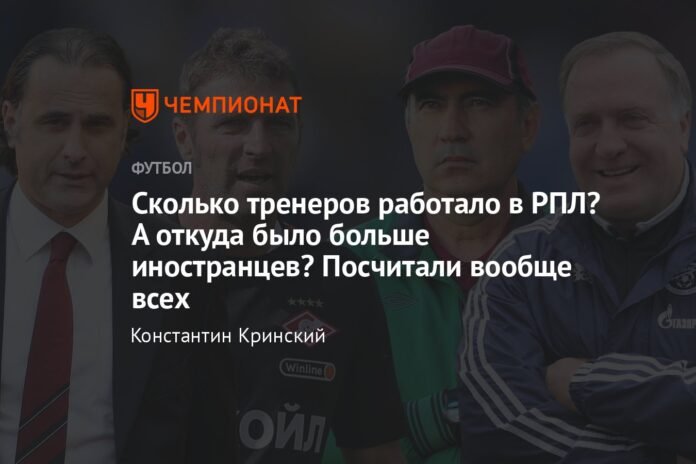Have you ever wondered how many coaches worked in the Russian championship? And specialists from which countries visited us more often than others? And when there was not a single foreign coach in the Premier League and when the thought of foreign coaches enveloped the RPL almost in half? About this and much more in the “Championship” study.
Russian Championship in the 90s: 0 foreigners → people from the CIS → the first coach from abroad
The first season of the Russian Championship was held in the 1992 draw. The beginning of a new country, the first steps of Russian football. Something unknown and therefore purely unique. In the 1992 season there was no foreign coach in the tower. And in general, until 1999, foreign specialists traveled to Russia only from the countries of the former USSR, that is, from a familiar cultural and linguistic environment.
In 1999, a foreign coach appeared for the first time in the Russian championship – Serbian Boris Bunyak headed Uralan. Officially, he is considered the first foreign coach in the history of Russian football. In fact, before that, specialists from the countries of the former USSR had dual citizenship: Russian and, for example, Ukrainian, Belarusian, Lithuanian or Georgian.
RPL foreign coaches. Representatives of the former USSR
Russian Championship in the 2000s: diversity of coaches → victory of Gazzaev and Advokat
Since the 2004 season, at least two foreign coaches must work in the Russian championship. There were even four in this draw: the Czech Vlastimil Petrzela (Zenit), the Portuguese Arthur Jorge (CSKA), the Italian Nevio Scala (Spartak) and the Frenchman Rolland Courbis (Alania).
From the mid-2000s until its end, Russian football experienced a heyday, recorded in history thanks to the victories of CSKA Valery Gazzaev and Zenit Dick Advocaat in the UEFA Cup. At that time, the RPL coaching palette was striking for its diversity. For example, in the 2002 season, specialists from three countries (Russia, Ukraine, Georgia) worked at the Russian Championship, in 2005 – nine, in 2008 – 10, and in 2009 – 12.
Russian Championship in the tenth: late crisis → record for foreign specialists → decline → cyclicality
The 2008 crisis affected Russian football late; This affected the diversity of coaches starting from the 2010 season, but by 2012 the situation had normalized and even resulted in an interesting situation: in the 2012/2013 season, the percentage of national coaches in the RPL was the lowest in the whole story: 54. That is, almost half of the coaches, 12 out of 26, were foreigners!
Percentage of foreign coaches in the Russian Championship (all seasons)
After 2014, the multinational flavor of RPL coaches was reduced. Never before have specialists from more than 10 countries worked at the Russian Championship in one season. The average dropped to seven in the following seasons.
Overall, if you look at the graph above, it is clear: after the 2013 crash, foreign coaches came to the RPL in waves; That is why the cyclical pattern is clearly visible, the fall gives way to an increase, and so on. Even more interesting is that the Russian championship in the 10s was perhaps the most competitive. And it was precisely in those three seasons when the league hired more foreign coaches (2012/2013-2014/2015).
How many coaches worked in the Russian championship? we count everyone
The three most popular nationalities among RPL coaches are Russia (195), Ukraine (15) and Belarus (10), which is very logical. They are followed by Spain (8), Germany and the Czech Republic (6 each), Italy and Serbia (5 each). There were many specialists who represented their country on their own at the Russian Championship, but the most interesting were Israel (Itzhak Shum, Alania-2005), Denmark (Michael Laudrup, Spartak-2008/2009), Bulgaria (Dimitar Dimitrov, “ Amkar – 2008/2009) and England (Paul Ashworth, Rostov – 2005).
All RPL coaches by citizenship
Some specialists have a second citizenship. For example, Valery Karpin has an Estonian passport. According to the statistics of the “Championship”, most of these foreign coaches, as a rule, work for a short time or are usually listed in the minutes as performing for one or several meetings (but there are exceptions such as Kurban Berdyev and Dmitry Parfenov). They were also included in our records. Here are some examples:
Ivan Danilyants – Russia/Austria/Moldova; Yuri Baturenko – Tajikistan/Russia; Kurban Berdyev – Turkmenistan/Russia; Dmitry Parfenov – Ukraine/Russia; Eduard Malofeev – Belarus/Russia; Vait Talgaev – Kazakhstan/Russia.
Where do the coaches of the Russian Championship come from?
There are several football schools in the world. We classify coaches from Russia and the former USSR in the same category. And specialists from the big football countries/regions will have to be divided. The influence of foreign coaches in the RPL was divided into: Spanish, German, Italian, Portuguese-Brazilian, Czechoslovak, Balkan (Serbia, Croatia, Montenegro) and Dutch-Belgian.
RPL foreign coaches. Spain
RPL foreign coaches. Germany
RPL foreign coaches. Italy
RPL foreign coaches. Portugal/Brazil
All RPL coaches. Czech Republic/Slovakia
RPL foreign coaches. Balkans
RPL foreign coaches. Netherlands/Belgium
Finally, some interesting numbers.
The largest season of the Russian Championship in terms of the number of national coaches is 1992 (29), the smallest seasons of the Russian Championship in terms of the number of national coaches are 2012/2013 and 2015/2016 (14 each). 100 – the largest percentage of national coaches in the Russian Championship season – 1992.54 – the smallest percentage of national coaches in the Russian Championship season – 2012/2013 None of the coaches from Western and Central Europe worked in Russia in more of a club. Miodrag Bozovic: foreign coach who holds the record for the number of jobs in the RPL (7). But the Montenegrin also worked in some clubs more than once.

